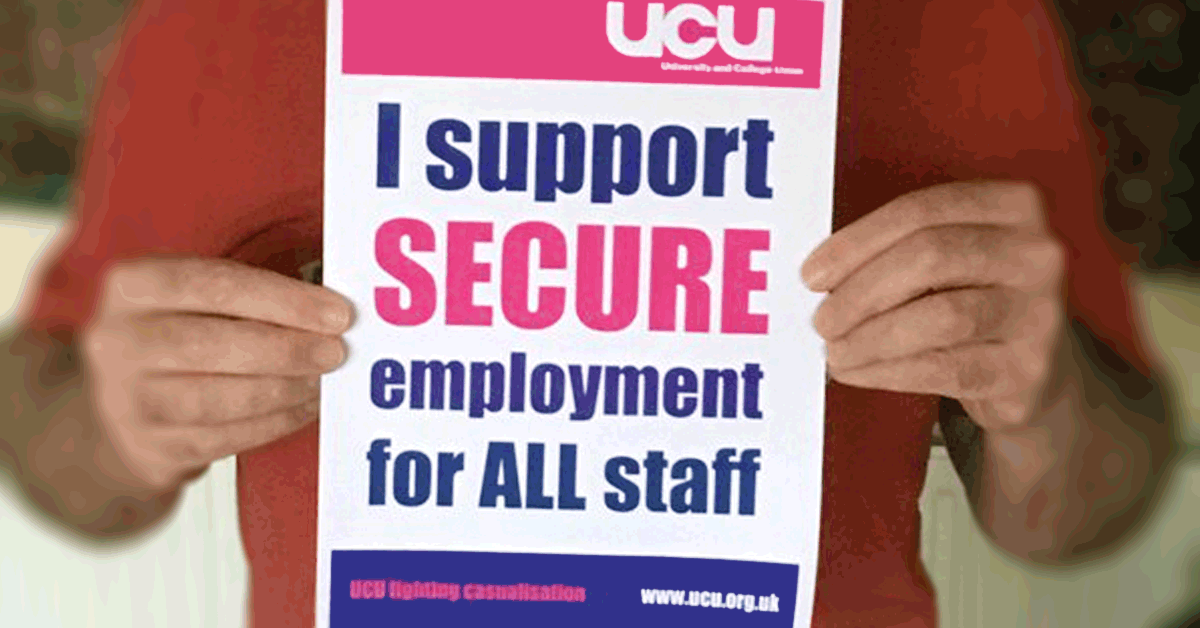
Stamp out casual contracts
23 July 2020
UCU believes that high quality education and fair working conditions depend on contracts that give staff stability and continuity of employment. Casualisation is bad for staff and bad for education, yet it's endemic in our colleges and universities.
Help build the campaign in your branch.
![]() Download the anti-casualisation pledge [160kb]
Download the anti-casualisation pledge [160kb]
46% of universities and 60% of colleges use zero hours contracts to deliver teaching.
68% of research staff in higher education are on fixed term contracts, with many more dependent on short-term funding for continued employment.
Stamp Out Casualisation is UCU's campaign to win continuity of employment and fairer contracts for casualised staff.
The campaign against casualisation is one of UCU's national priorities.
Making a difference: latest news from our campaign against casual contracts
Read more about how UCU is working toward and winning greater continuity of employment and better pay for casualised staff.
Fighting casualisation - what can I do?
A guide for UCU members on how to help the fight against casual contracts in the workplace, and how every member can play a part in challenging casualisation:
![]() Fighting casualisation - what can I do? [677kb]
Fighting casualisation - what can I do? [677kb]
Casualised staff are second-class citizens
Staff on casualised contracts in UK universities are vulnerable and invisible 'second-class academics', says a UCU report.
The report, published in January 2020, says universities' bold statements about how much they value their staff ring hollow when put against how thousands of staff without secure contracts staff are treated. 'Second class academic citizens', by Nick Megoran and Olivia Mason of Newcastle University for UCU, says casualised academic labour is 'dehumanising' because casualised staff are:
- rendered invisible and treated as second-class academic citizens
- left vulnerable to exploitative practices
- denied the academic freedom that should be a hallmark of an academic career
- prevented from being able to plan a professional or personal life.
![]() Second class academic citizens, Jan 20 [277kb]
Second class academic citizens, Jan 20 [277kb]
Read the full press release here
Counting the costs of casualisation
Research from UCU in 2019 found that staff on insecure contracts working in further, adult and prison education are holding down multiple jobs and visiting food banks in an effort to makes ends meet. The report exposes the lie that flexible contracts are supported by workers and employers as it found that almost all staff want a permanent contract and around three-quarters said they would sacrifice flexibility to secure a job with guaranteed hours:
![]() Counting the costs of casualisation in further education, Jun 19 [711kb]
Counting the costs of casualisation in further education, Jun 19 [711kb]
Read also: Teaching staff on casual contracts visiting food banks as they struggle to make ends meet
A similar picture exists in higher education, with the latest UCU report revealing that staff on insecure contracts are reporting that the lack of security is damaging their mental and physical health while they have to hold down multiple jobs while struggling to pay bills. The report warns that the widespread use of casual contracts is damaging the quality of research and the education students receive.
![]() Counting the costs of casualisation in higher education, Jun 19 [318kb]
Counting the costs of casualisation in higher education, Jun 19 [318kb]
Read also: 71% of university staff say insecure contracts have damaged their mental health
A snapshot of precarious work and institutional attitudes in our colleges and universities
In 2016 UCU wrote to every college in England and every university in the UK where the union has a branch, asking them to engage with us in tackling the abuse of casual contracts.
We have collated the results of this exercise alongside other available data and have provided tables for you to see how your institution ranks in a series of indexes of insecurity.
We regularly follow up this research with further Freedom of Information data requests:
![]() Precarious teachers: insecure work in the English further education sector, May 17 [560kb]
Precarious teachers: insecure work in the English further education sector, May 17 [560kb]
![]() Precarious work in higher education, November 2016 update [423kb]
Precarious work in higher education, November 2016 update [423kb]
Anti-casualisation committee
UCU has an advisory committee representing staff on casualised contracts, elected at an annual meeting for casualised staff.
The committee's priorities are:
- make use of the current public and political profile of zero-hours contracts to strengthen the drive to eradicate this form of contracts from post-secondary education.
- work to ensure that the struggle against casualisation in all forms is a central negotiating and bargaining issue at all levels of the union.
- promote and support campaigning, organising and bargaining initiatives at local institutional level to translate our national objectives into tangible successes that win greater continuity and security of employment and fair treatment for all staff on all forms of casual contract.
- build a bank of personal testimonies about life on casualised contracts to enhance the union's campaigning, organising and bargaining work.
- work to ensure that the annual meeting for casualised staff is well attended and fully representative of casualised staff in post-secondary education
- continue to support and encourage the recruitment of casualised staff
- produce at least two editions of .
Further information about the campaign can be obtained from Position vacant.
If you are a member who has a query about any issue please contact your branch or local association in the first instance.
- PrintPrint this page
- Share

